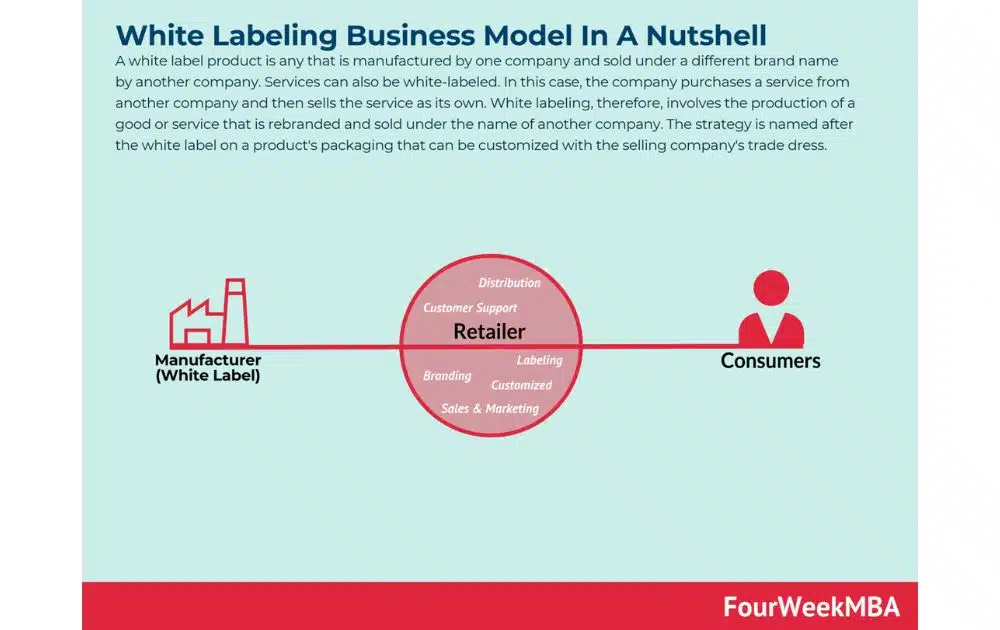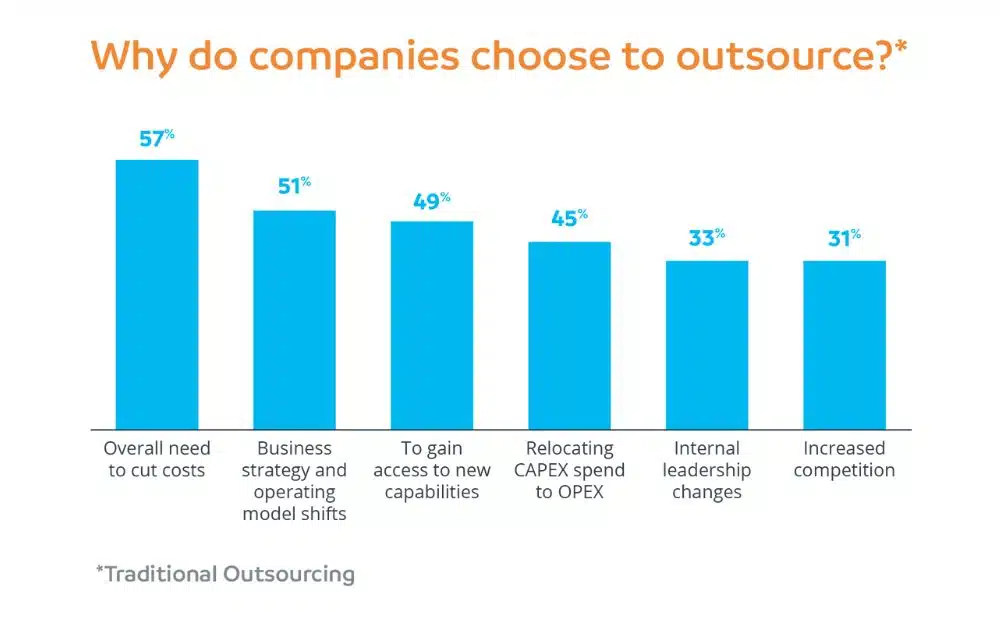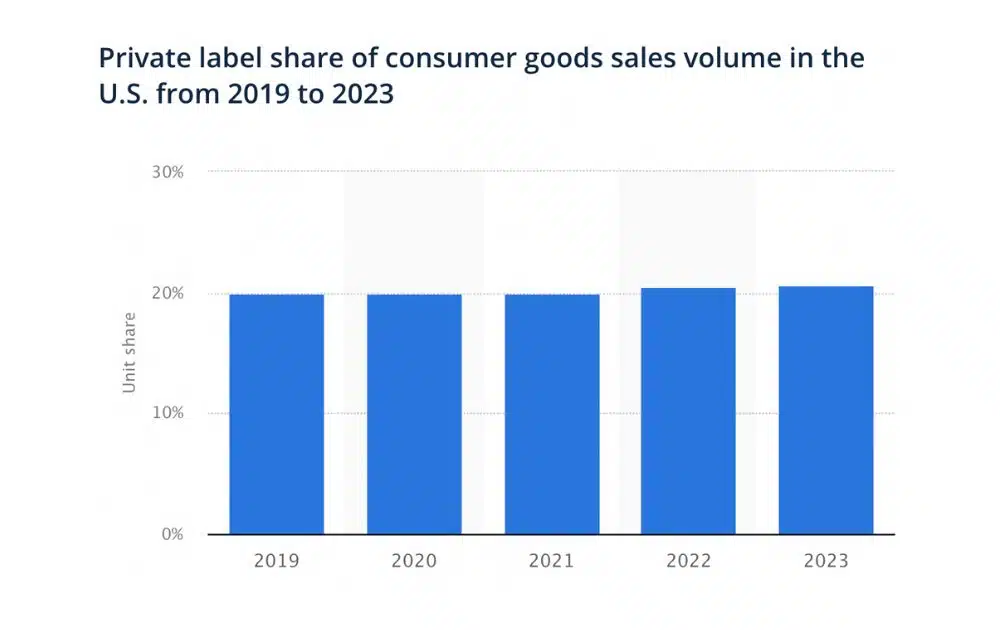How Do White Label Products Work?
What does white label mean? You may have already purchased, reviewed, and recommended such products. You just didn’t know it at that time.
Without a doubt, white label products are a powerful secret in modern business. It enables businesses to sell goods without the need for a full-scale manufacturing operation.
Let’s unpack what white label products are and how they work. We’ll also look at its benefits and risks, and discuss how you can work with manufacturers and suppliers who offer it.
What Are White Label Products?
White label products are generic goods or services manufactured by one company for clients to rebrand these products for resale.
These products are typically sold without any brand attached, giving buyers the freedom to customize the following aspects:
- Packaging
- Logo
- Overall branding
This model allows entrepreneurs and small businesses to offer ready-made solutions without the complexity of developing and manufacturing them from scratch.
This image from the FourWeekMBA offers a good visual summary of what while label products are:

In the world of product sourcing and wholesale sourcing, white labeling offers a low-barrier entry point into competitive markets. Instead of investing months into R&D, you can purchase pre-formulated skincare, private software tools, or even home goods and sell them as your own.
That’s why white label products are especially popular among ecommerce sellers, influencers launching personal brands, and agencies offering turnkey services.
Many businesses offer these popular white label products:
- Skincare and beauty products
- Supplements and wellness items
- Apparel and fashion
- Tech accessories
- Drinkware
- Pet products
- Home and lifestyle goods
- Coffee and tea
White label products provide a fast, affordable way to test ideas, expand your catalog, and scale with minimal risk.
How White Label Works
You can build a brand around white label products without owning a factory, running a lab, or investing heavily in research and development. Instead, you partner with a manufacturer that already produces a generic version of what you want to sell, then you rebrand it as your own.
Here’s how it works, step by step:
- Find a supplier. You search for manufacturers that offer ready-made white label products in your niche. For instance, you might consider skincare, supplements, or tech accessories
- Select a product. Choose from their catalog of unbranded goods.
- Customize the branding. Incorporate your branding by adding your logo, color scheme, packaging style, and marketing assets.
- Place an order. Depending on the agreement, you might buy in bulk (wholesale) or have items shipped on demand.
- Sell under your brand. Once you receive the products, you’re free to sell them online, in retail stores, or even via dropshipping.
Benefits of White Label
White label branding gives businesses a head start by eliminating the need for product development. Instead of creating something from scratch, you start with a ready-made product and focus entirely on:
- Branding
- Marketing
- Customer experience
Here are some of the biggest advantages:
Lower Costs Upfront
White labeling is generally a form of outsourcing―specifically, outsourcing manufacturing and product development. That said, the number one reason companies outsource, according to industry data, is the overall need to cut costs, cited by 57% of respondents.
White label products let you skip the expensive R&D, testing, and manufacturing setup. You only pay for what’s already been built.

Faster Time to Market
With white label branding, you don’t need to wait months to launch. You can rebrand a product and start selling within weeks. This is ideal for trend-based industries like beauty, fashion, and tech accessories.
Focus on Marketing, Not Manufacturing
White labeling allows businesses to allocate more resources toward branding, customer acquisition, and storytelling. These are critical elements for ecommerce success.
Access to Expertise and New Capabilities
Nearly half of all companies outsource to tap into capabilities not available within their organization. White label suppliers are often specialists in their field, giving you access to high-quality products without needing deep product knowledge yourself.
Risks of White Label
White label branding also comes with risks, especially since you’re outsourcing key parts of your business. Here are a few common ones:
Poor Vendor Performance
You rely heavily on your supplier’s performance, particularly when using a white label dropshipping model. If they miss deadlines, deliver subpar goods, or struggle during transitions, your brand takes the brunt of the impact.
In fact, Deloitte’s Global Outsourcing Survey 2024 found that 46% of companies identified poor vendor performance as one of the significant outsourcing challenges.

Limited Differentiation
Because many companies may be using the exact same white label products, your offering might not stand out. Without custom features or exclusive formulations, your brand relies heavily on marketing to create perceived value.
Branding Risks
If the supplier has quality control issues, your customers won’t blame them; they’ll blame you. Since the product carries your branding, any defect directly affects your brand reputation and customer trust.
Supplier Dependency
Your business becomes closely tied to your white label manufacturer. If they raise prices, shut down, or change terms unexpectedly, you may struggle to pivot quickly.
This type of vendor dependency is a common issue reported under poor vendor relationship management, cited by 36% of businesses.
White Label vs Private Label
White label and private label are frequently mistaken for one another, but they refer to different business models. While both involve selling products under your own brand, they differ in terms of customization, exclusivity, and the level of control you have over the final product.
Private label products are made by a manufacturer specifically for one retailer, often with unique specifications or formulations. Here are some of the features of private labeling compared to white labeling:
- High customization. The client can request to adjust the ingredients, materials, or other features.
- Product ownership. Products are often exclusive to the retailer; some even own the product formula
- Slower speed to market. It’s slower to put the products on the shelves due to development and approvals.
For instance, a skincare line might develop a unique blend of ingredients and packaging under a retailer’s exclusive brand. Because of its customization and exclusivity, many business owners who have the money to invest go for private labeling.
In fact, 2023 data in the U.S. revealed that private labels accounted for 20.7% of consumer goods sales.

So, what’s best? The answer wholly relies on your business goals and strategy. If you want to move fast and test the market, white label is ideal. But if you’re focused on building long-term product exclusivity and innovation, private label might be a better path.
How to Work with a While Label Supplier
Here’s how to effectively coordinate with a white label supplier for your business needs:
Define Your Product Vision
Before approaching any white label manufacturers/suppliers, clarify what you want to sell—whether it’s cosmetics, electronics, or wellness products.
- Actionable Tip. Create a short product brief that includes features, design preferences, and estimated price range.
Research and Shortlist Reputable Suppliers
Use directories like Alibaba, SaleHoo, or ThomasNet to find verified white label suppliers. Check reviews, ratings, and certifications.
- Actionable Tip. Prepare a spreadsheet comparing suppliers based on MOQs (minimum order quantities), lead time, pricing, and customization.
Request Product Samples
Ask for samples to assess quality and packaging firsthand.
- Actionable Tip. Rate product quality, packaging durability, labeling accuracy, and delivery speed.
Negotiate Terms and Pricing
Once you’re happy with a supplier, negotiate payment terms, production timelines, and scalability.
- Actionable Tip. Ask about bulk discounts, reorder terms, and return policies up front. Keep all agreements in writing.
Ensure Branding and Packaging Customization
A good white label products manufacturer should allow private labeling, such as custom logos, packaging, and inserts.
- Actionable Tip. Submit your logo and brand guidelines in vector format to ensure sharp printing. Ask for a digital mock-up before production.
Confirm Compliance and Legal Documents
Make sure your products meet regulatory standards in your selling region.
- Actionable Tip. Request product certifications, safety tests, and MSDS (Material Safety Data Sheets) if applicable. This is crucial if you’re selling food, supplements, or cosmetics.
Test a Small Batch First
Start with a pilot order first so you can check how reliable the supplier is and if the product really meets your expectations.
- Actionable Tip. Use this first batch for beta sales or influencer seeding. Gather feedback and refine before scaling.
The Bottom Line
White label products offer a fast, cost-effective path to launching your own brand without the burden of building everything from scratch. But like any business model, success depends on your strategy and your choice of partner.
Vet your white label manufacturers/suppliers thoroughly, start small, and always prioritize quality and compliance.
Need expert help scaling your white label products on Amazon? AMZ Advisers can help you optimize listings, improve visibility, and turn white label items into bestsellers. Reach out to AMZ Advisers today to grow your brand the smart way.
Author
 Carla Bauto Deña is a journalist and content writer producing stories for traditional and digital media. She believes in empowering small businesses with the help of innovative solutions, such as ecommerce, digital marketing, and data analytics.
Carla Bauto Deña is a journalist and content writer producing stories for traditional and digital media. She believes in empowering small businesses with the help of innovative solutions, such as ecommerce, digital marketing, and data analytics.
The post How Do White Label Products Work? appeared first on AMZ Advisers.


